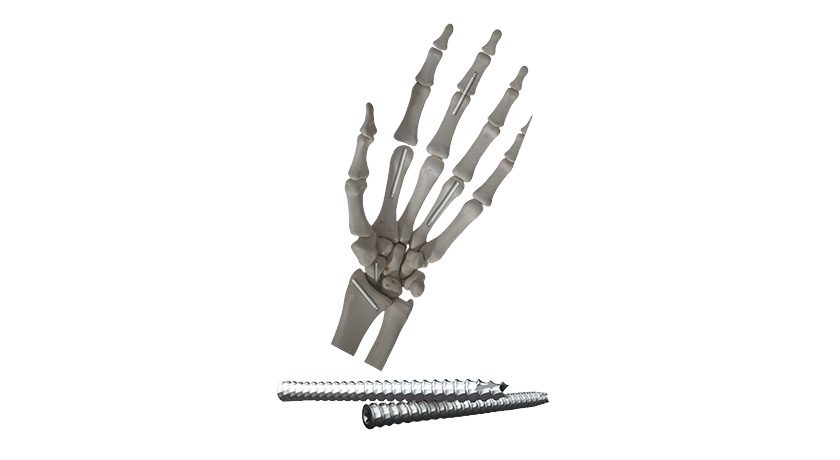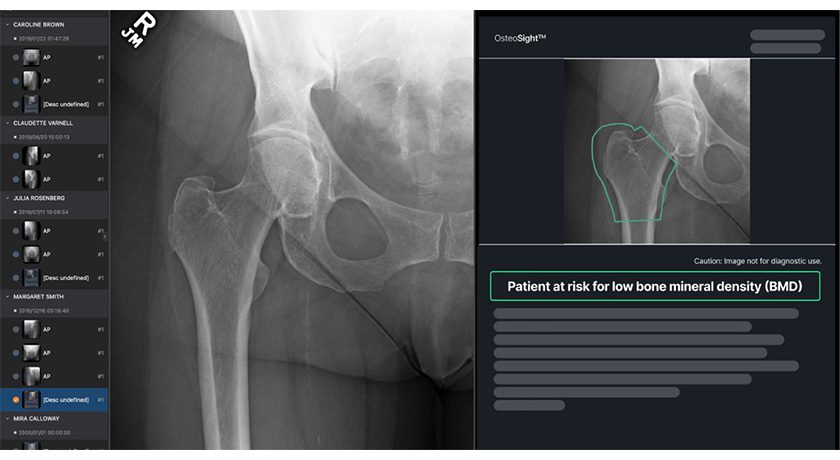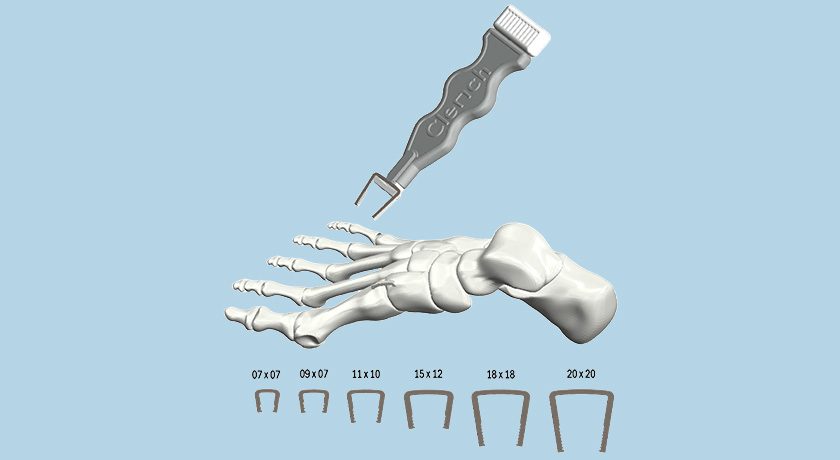

 Copy to clipboard
Copy to clipboard 
Zimmer Biomet agreed to acquire Monogram Technologies and its semi-autonomous knee robot, continuing the company’s string of strategic moves in enabling technology.
Enabling technology, especially robotics, is disrupting the competitive dynamics in joint replacement. Zimmer Biomet is betting that a portfolio of technologies that support varying surgeon preferences will help it gain ground in robotics and defend its position as the largest company in joint replacement.
“Monogram’s technology is a major leap forward, demonstrating our commitment to becoming the boldest and broadest innovator in surgical robotics and navigation,” said Ivan Tornos, President and Chief Executive Officer of Zimmer Biomet. “With Monogram’s proprietary technology, Zimmer Biomet has the potential to become the first company to deliver fully autonomous capabilities and redefine both the standard of care and the future of orthopedic surgery.”
According to our numbers, Zimmer Biomet has a 3% lead over Stryker in global joint replacement sales. However, Stryker’s sales account for 32% of the enabling technology market compared to Zimmer Biomet’s 7%. Stryker’s early lead with the Mako system has forced its competitors to play catch-up.
Zimmer Biomet has been especially focused on leveling the playing field with its competition in the U.S. in faster-growing segments like ASCs, sports medicine, extremities and enabling technology.
“We’re changing the whole dynamic when it comes to the U.S.,” Mr. Tornos said. “We’ve been talking about specialization for a while. We need to have the right amount of people behind the right businesses. We know we can do better in robotics, if we add the right quantity and quality of individuals. The changes make sure we have the right quantity and quality of leaders, as well as incentive plan. I know this is not something that is new. We’re just going faster at it because we deserve to grow at a faster pace in the U.S.”
In the last three years, Zimmer Biomet acquired OrthoGrid and solidified partnerships with THINK Surgical and HipInsight. Over the next three years, Zimmer Biomet is expected to launch new ROSA applications, including total shoulder, posterior hip and CT, as well as mBôs semi-autonomous and autonomous for knee replacement. The company also plans to add 200 additional robotic clinical sales representatives.
Last week’s announcement involved Zimmer Biomet purchasing all outstanding shares of Monogram’s stock for an upfront payment of $4.04/share in cash. This corresponds to an equity value of approximately $177 million and an enterprise value of roughly $168 million. Investors largely favored the acquisition of Monogram.
If Zimmer Biomet’s goal is to have the broadest enabling tech portfolio in orthopedics, we believe the Monogram acquisition helps them achieve it with a differentiated robotic system. Some questions remain, though. How will the company’s robotic systems compete against or complement each other? How many surgeons want to use semi-autonomous or fully autonomous robotic systems? Will more options really lead to greater penetration of robotics?
What is certain is that Zimmer Biomet’s latest enabling technology acquisitions and partnerships have the company partnering with industry visionaries that offer them advanced technology and progressive expertise to compete in the market.
Acquisition of Monogram Orthopedics
Monogram received FDA 510(k) clearance for mBôs, a semi-autonomous, AI-navigated total knee replacement robotic system, and is developing a fully autonomous version. Zimmer Biomet expects to commercialize mBôs with its orthopedic implants and navigation systems, including OrthoGrid in early 2027, while the autonomous version of mBôs is scheduled to launch in late 2027 or early 2028.
Douglas Unis, M.D., Founder and Chief Medical Officer at Monogram Orthopedics, spoke at OMTEC in 2019. He said the first generation of orthopedic robots was too expensive and slow in the O.R. and likened them to an Atari in a world where industrial robotics is significantly more advanced. Dr. Unis’ vision is to make robotics faster, safer and with minimal disruption to a surgeon’s workflow.
“Our robot is lightweight and agile with a long reach and 7° of freedom, allowing it to perform any number of tasks while remaining out of the surgical team’s way and not disrupting normal O.R. workflow,” Dr. Unis said. “We have eliminated line-of-sight issues like pole-mounted cameras by equipping the robot itself with advanced machine vision. We have developed dynamic obstacle avoidance capability and optimized the robotic cut paths in real time, facilitating safe automated robotic motion and dramatically improving efficiency.”
Acquisition of OrthoGrid Systems
Zimmer Biomet closed its acquisition of OrthoGrid Systems in 2024, giving the company an AI-powered, fluoroscopy-based surgical assistance platform for hip replacement surgery. Hip AI provides real-time image analysis, automated measurements of leg length and offset, and guidance on optimal cup placement, all while maintaining a small O.R. footprint.
Richard Boddington, CEO of OrthoGrid prior to the acquisition, told us that data and AI would transform hip replacement by ensuring optimal patient outcomes. Mr. Boddington cautioned that the transition to complex AI platforms is not quick or easy. To leverage large models or algorithms, orthopedic companies would need to heavily invest in or acquire the expertise to build digital solutions.
“It also takes time and expertise to build digital solutions and, most importantly, to build them right,” Boddington said in 2023. “We’ve spent five years building and perfecting AI-powered models. Implant companies are watching for opportunities and exploring options in the AI space. We’re focused on building effective models to optimize our position in that market.”
During its earnings call in the first quarter of 2025, Zimmer Biomet executives mentioned OrthoGrid as one of the products that has helped the company’s hip replacement portfolio return to its offensive position.
Distribution Agreement with THINK Surgical
Zimmer Biomet announced the agreement in June 2024, noting that while ROSA remains its flagship robot, the partnership with THINK Surgical provides the company with a handheld platform to accelerate its adoption of robotics in knee replacement surgery.
THINK President and CEO, Stuart Simpson, is an orthopedic industry veteran who led Stryker’s entry into robotics with the acquisition of Mako Surgical. When we spoke to Mr. Simpson, he predicted that companies of all sizes would need to partner with open platforms to extend their robotic offerings and defend their implant share.
“I have regular meetings with the very senior executives in those companies,” Mr. Simpson said. “I tell them exactly what we’re doing, fully transparent, and I reassure them that I’m not an implant company; I’m not coming to eat their lunch. I’m offering them a different channel to put their implants on the market.
“If the customers in the U.S. respond well to my value proposition, in other words, if 10%, 20% or 30% decide that the open platform is the way to go, then the big companies have to participate.”
Zimmer Biomet is the only company of the four large knee replacement players to partner with THINK. THINK recently announced that the TMINI Miniature Robotic System had been used in 1,000 procedures, approximately one-third of which were completed with Zimmer Biomet’s Persona Knee.
The need for robotics and navigation in the O.R. is still a hotly contested topic among orthopedic surgeons, and the technology has a low adoption rate. Orthopedic companies believe the use of these tools will accelerate as younger surgeons are trained in them and integrate them into their practice, and as the technology decreases in price and increases in efficiency.
Zimmer Biomet’s strategy of having the broadest offerings in enabling technology seems sound. Thus far, it has helped the company across its knee, hip and shoulder replacement portfolios. But with mBôs not reaching the market until 2027, it will take years to evaluate the success of Zimmer Biomet’s strategy.
Zimmer Biomet agreed to acquire Monogram Technologies and its semi-autonomous knee robot, continuing the company’s string of strategic moves in enabling technology.
Enabling technology, especially robotics, is disrupting the competitive dynamics in joint replacement. Zimmer Biomet is betting that a portfolio of technologies that support...
Zimmer Biomet agreed to acquire Monogram Technologies and its semi-autonomous knee robot, continuing the company’s string of strategic moves in enabling technology.
Enabling technology, especially robotics, is disrupting the competitive dynamics in joint replacement. Zimmer Biomet is betting that a portfolio of technologies that support varying surgeon preferences will help it gain ground in robotics and defend its position as the largest company in joint replacement.
“Monogram’s technology is a major leap forward, demonstrating our commitment to becoming the boldest and broadest innovator in surgical robotics and navigation,” said Ivan Tornos, President and Chief Executive Officer of Zimmer Biomet. “With Monogram’s proprietary technology, Zimmer Biomet has the potential to become the first company to deliver fully autonomous capabilities and redefine both the standard of care and the future of orthopedic surgery.”
According to our numbers, Zimmer Biomet has a 3% lead over Stryker in global joint replacement sales. However, Stryker’s sales account for 32% of the enabling technology market compared to Zimmer Biomet’s 7%. Stryker’s early lead with the Mako system has forced its competitors to play catch-up.
Zimmer Biomet has been especially focused on leveling the playing field with its competition in the U.S. in faster-growing segments like ASCs, sports medicine, extremities and enabling technology.
“We’re changing the whole dynamic when it comes to the U.S.,” Mr. Tornos said. “We’ve been talking about specialization for a while. We need to have the right amount of people behind the right businesses. We know we can do better in robotics, if we add the right quantity and quality of individuals. The changes make sure we have the right quantity and quality of leaders, as well as incentive plan. I know this is not something that is new. We’re just going faster at it because we deserve to grow at a faster pace in the U.S.”
In the last three years, Zimmer Biomet acquired OrthoGrid and solidified partnerships with THINK Surgical and HipInsight. Over the next three years, Zimmer Biomet is expected to launch new ROSA applications, including total shoulder, posterior hip and CT, as well as mBôs semi-autonomous and autonomous for knee replacement. The company also plans to add 200 additional robotic clinical sales representatives.
Last week’s announcement involved Zimmer Biomet purchasing all outstanding shares of Monogram’s stock for an upfront payment of $4.04/share in cash. This corresponds to an equity value of approximately $177 million and an enterprise value of roughly $168 million. Investors largely favored the acquisition of Monogram.
If Zimmer Biomet’s goal is to have the broadest enabling tech portfolio in orthopedics, we believe the Monogram acquisition helps them achieve it with a differentiated robotic system. Some questions remain, though. How will the company’s robotic systems compete against or complement each other? How many surgeons want to use semi-autonomous or fully autonomous robotic systems? Will more options really lead to greater penetration of robotics?
What is certain is that Zimmer Biomet’s latest enabling technology acquisitions and partnerships have the company partnering with industry visionaries that offer them advanced technology and progressive expertise to compete in the market.
Acquisition of Monogram Orthopedics
Monogram received FDA 510(k) clearance for mBôs, a semi-autonomous, AI-navigated total knee replacement robotic system, and is developing a fully autonomous version. Zimmer Biomet expects to commercialize mBôs with its orthopedic implants and navigation systems, including OrthoGrid in early 2027, while the autonomous version of mBôs is scheduled to launch in late 2027 or early 2028.
Douglas Unis, M.D., Founder and Chief Medical Officer at Monogram Orthopedics, spoke at OMTEC in 2019. He said the first generation of orthopedic robots was too expensive and slow in the O.R. and likened them to an Atari in a world where industrial robotics is significantly more advanced. Dr. Unis’ vision is to make robotics faster, safer and with minimal disruption to a surgeon’s workflow.
“Our robot is lightweight and agile with a long reach and 7° of freedom, allowing it to perform any number of tasks while remaining out of the surgical team’s way and not disrupting normal O.R. workflow,” Dr. Unis said. “We have eliminated line-of-sight issues like pole-mounted cameras by equipping the robot itself with advanced machine vision. We have developed dynamic obstacle avoidance capability and optimized the robotic cut paths in real time, facilitating safe automated robotic motion and dramatically improving efficiency.”
Acquisition of OrthoGrid Systems
Zimmer Biomet closed its acquisition of OrthoGrid Systems in 2024, giving the company an AI-powered, fluoroscopy-based surgical assistance platform for hip replacement surgery. Hip AI provides real-time image analysis, automated measurements of leg length and offset, and guidance on optimal cup placement, all while maintaining a small O.R. footprint.
Richard Boddington, CEO of OrthoGrid prior to the acquisition, told us that data and AI would transform hip replacement by ensuring optimal patient outcomes. Mr. Boddington cautioned that the transition to complex AI platforms is not quick or easy. To leverage large models or algorithms, orthopedic companies would need to heavily invest in or acquire the expertise to build digital solutions.
“It also takes time and expertise to build digital solutions and, most importantly, to build them right,” Boddington said in 2023. “We’ve spent five years building and perfecting AI-powered models. Implant companies are watching for opportunities and exploring options in the AI space. We’re focused on building effective models to optimize our position in that market.”
During its earnings call in the first quarter of 2025, Zimmer Biomet executives mentioned OrthoGrid as one of the products that has helped the company’s hip replacement portfolio return to its offensive position.
Distribution Agreement with THINK Surgical
Zimmer Biomet announced the agreement in June 2024, noting that while ROSA remains its flagship robot, the partnership with THINK Surgical provides the company with a handheld platform to accelerate its adoption of robotics in knee replacement surgery.
THINK President and CEO, Stuart Simpson, is an orthopedic industry veteran who led Stryker’s entry into robotics with the acquisition of Mako Surgical. When we spoke to Mr. Simpson, he predicted that companies of all sizes would need to partner with open platforms to extend their robotic offerings and defend their implant share.
“I have regular meetings with the very senior executives in those companies,” Mr. Simpson said. “I tell them exactly what we’re doing, fully transparent, and I reassure them that I’m not an implant company; I’m not coming to eat their lunch. I’m offering them a different channel to put their implants on the market.
“If the customers in the U.S. respond well to my value proposition, in other words, if 10%, 20% or 30% decide that the open platform is the way to go, then the big companies have to participate.”
Zimmer Biomet is the only company of the four large knee replacement players to partner with THINK. THINK recently announced that the TMINI Miniature Robotic System had been used in 1,000 procedures, approximately one-third of which were completed with Zimmer Biomet’s Persona Knee.
The need for robotics and navigation in the O.R. is still a hotly contested topic among orthopedic surgeons, and the technology has a low adoption rate. Orthopedic companies believe the use of these tools will accelerate as younger surgeons are trained in them and integrate them into their practice, and as the technology decreases in price and increases in efficiency.
Zimmer Biomet’s strategy of having the broadest offerings in enabling technology seems sound. Thus far, it has helped the company across its knee, hip and shoulder replacement portfolios. But with mBôs not reaching the market until 2027, it will take years to evaluate the success of Zimmer Biomet’s strategy.

You’ve reached your limit.
We’re glad you’re finding value in our content — and we’d love for you to keep going.
Subscribe now for unlimited access to orthopedic business intelligence.
CL
Carolyn LaWell is ORTHOWORLD's Chief Content Officer. She joined ORTHOWORLD in 2012 to oversee its editorial and industry education. She previously served in editor roles at B2B magazines and newspapers.







